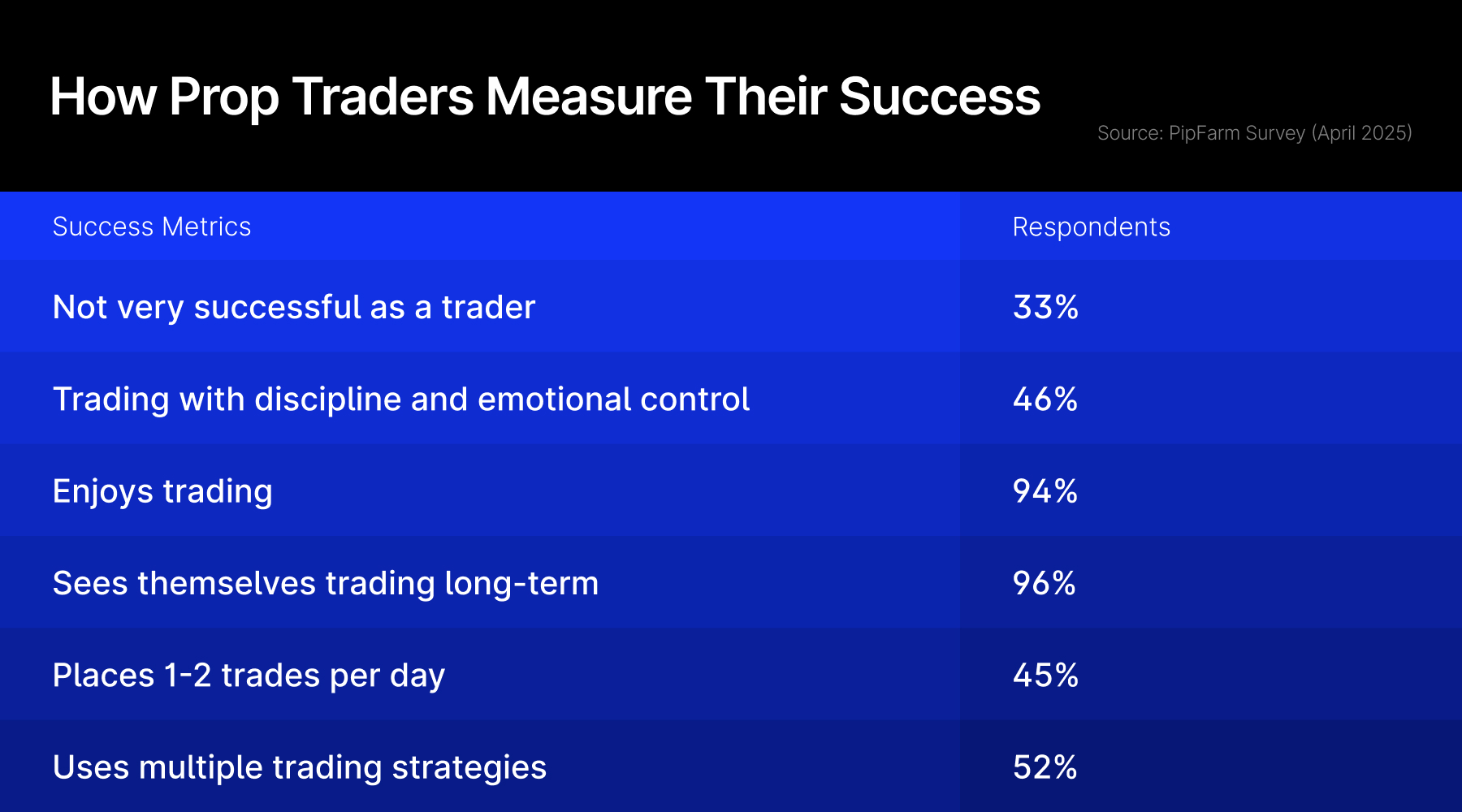60% of Prop Traders Juggle Multiple Firms, While 40% Battle Mental Challenges, Study Finds
Nearly two-thirds of retail prop traders work with multiple trading firms simultaneously, primarily to manage risk and increase available capital, according to a new survey conducted by PipFarm in April 2025.
The newest study, which collected responses from 2,777 prop traders, found that 63% of participants trade with more than one proprietary trading firm concurrently. Among those maintaining multiple relationships, 51% work with two firms, while 30% juggle three different companies.
Prop Traders Confess Why They're Spreading Bets Across Multiple Firms
"Risk diversification across different firms" emerged as the leading motivation (34.3%) for maintaining multiple accounts, closely followed by "increasing total capital available for trading" (33.8%). Approximately one-quarter of respondents (25.8%) cited the need to "stay active while waiting for evaluations or payouts from another firm" as their primary reason.

"Last year was a tough year for the industry, and it woke traders up to the reality of counterparty risk," said James Glyde, PipFarm CEO. "However, this risk is not just about firms going out of business. It comes in the form of rule changes and restrictions that can impact traders' ability to earn.”
“Some more advanced traders are becoming conscious of the burden they may become to a firm if they make too much, too fast. That's why having funded accounts with multiple firms is important,” Glyde added.
One of PipFarm’s earlier surveys revealed that clients tend to trust broker-backed prop firms more, with 3 out of 5 respondents confirming this view. The current wave of prop firms seeking licenses - even if largely offshore and of questionable quality - appears to support that finding.
Traders Don't Consider Themselves Successful
The findings come as the prop trading industry continues to expand, with more firms offering funded accounts to traders who can pass increasingly standardized evaluation challenges.
Despite the growth, traders report mixed results in their performance. When asked to rate their success, only 11.2% described themselves as "very successful," while nearly a third (32.7%) admitted they were "not very successful." Another 30.4% characterized their performance as "somewhat successful."
Despite these, a striking 94% of respondents reported they enjoy trading, and 96.3% see themselves continuing to trade long-term.
You may also like: “MetaQuotes Did a Huge Favor for Prop Trading”; 70% of Traders Want Regulation
Investors Struggle More with Emotions Than Charts
The survey revealed significant psychological challenges facing traders. The most common difficulties reported were "lack of discipline or self-control" (37.8%) and "emotional trading after losses" (37.5%), followed by "financial pressures" (35%).

Glyde noted that social comparison may be contributing to these psychological challenges.
"Like most areas in life, traders anchor their aspirations to what they see on social media and often feel inadequate in comparison to what they see," he said. "While this is speculation, I'm keen to dig deeper into this topic with future surveys to find where we can help traders feel more fulfilled from their trading."
To combat psychological barriers, many traders are investing in mental performance tools. Over 43% reported listening to podcasts about mindset and psychology, while 41.5% maintain journals to build self-awareness. Nearly 40% read self-help or trading psychology books.
Few Instruments and Not Many Trades Per Day
The survey also provides insight into trading habits. Most respondents (45.1%) place only 1-2 trades per day, with another 28.7% executing 3-5 daily trades. More than half (51.6%) employ multiple trading strategies.
A survey conducted last year showed that around 60% of prop firm clients lose money, with an average investment of $4,300.

Screen time appears moderate for most traders, with 43.8% spending 2-4 hours daily watching trading charts and platforms. Sleep patterns varied, with 48.6% getting 6-7 hours nightly, though a notable 24.5% reported sleeping less than 6 hours per night.
Entry costs remain relatively accessible, with 34.8% of traders paying less than $50 for their first prop firm challenge, and another 24.4% spending between $50-$99.
I also encourage you to check out my earlier article, where I describe how Glyde uncovered a global cartel of 800 traders who were manipulating proprietary trading challenges.



